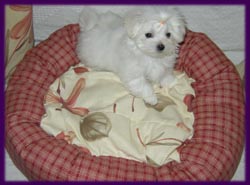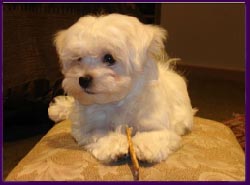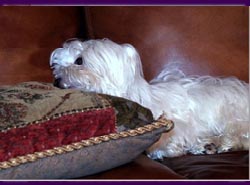Thinking of getting a new Maltese puppy? Keep these things in mind before your bring your puppy home. But from a caring breeder who focuses on quality dogs. Make sure that before the puppy leaves for his new home the breeder has given them the appropriate number of vaccines for their age. Make sure you get a written agreement and a health record. If you are purchasing your Maltese from a breeder that does not meet these requirements you should seriously reconsider your purchase.
The first week your Maltese is with you life will be new and hectic and there might be times when you wonder if getting a puppy was such a good idea. It was! Things will get better if you have patience and lots of love and understanding. Remember that puppy hood is temporary and the effort you put into it now will pay off in the future.
Things you should get before you bring your puppy home
Crates and Pens
Pens, like a Li'l Pen offer your pet a bigger area to play and live in.
Li'l Pens offer your pet a safe area to play in and stay out of trouble. Also, if you are going to be
out of the house for long periods of time, you might want to consider putting your pet in a pen(instead of a crate) with a water bottle, food and a puppy
pad. These pens offer a containment area at home, outside in the yard, and on vacation.
A "crate" offers your puppy a safe "room" of his own where he can go and hang out as well as giving him a safe, cozy place to stay. Crates can also help train your puppy. Housebreaking goes much faster when you use a crate. Crates are also useful when traveling to ensure the safety for both you and your dog.
There are mainly 2 types of crates; plastic and wire. A crate should only be big enough
for the dog to stand up, turn around, lie down comfortably and stretch out on his side to sleep.
Bedding
 Your puppy will do a lot of sleeping when he comes home. Usually puppies will need a lot of rest after playing. Make sure that you place your puppy's bed out of the main stream of the household traffic that will allow him to rest comfortably and without too many interruptions. If you have purchased a crate for your puppy you might want to add a washable soft pad to make the crate a cozy place to sleep.
Look for crate pads that are made of silky fabrics or soft cotton. Avoid purchasing beds made out of wood or wicker as you puppy might chew on this and harm himself.
Look for beds made of the same silky type of fabrics as those for the crate pads. For custom, high quality, handmade beds contact Tam for suggestions.
Your puppy will do a lot of sleeping when he comes home. Usually puppies will need a lot of rest after playing. Make sure that you place your puppy's bed out of the main stream of the household traffic that will allow him to rest comfortably and without too many interruptions. If you have purchased a crate for your puppy you might want to add a washable soft pad to make the crate a cozy place to sleep.
Look for crate pads that are made of silky fabrics or soft cotton. Avoid purchasing beds made out of wood or wicker as you puppy might chew on this and harm himself.
Look for beds made of the same silky type of fabrics as those for the crate pads. For custom, high quality, handmade beds contact Tam for suggestions.
Grooming Items
Make sure you get all the grooming items you need when you get your puppy so that you can start your puppy on a grooming routine as soon as you bring him home. You will need a brush, comb, nail clippers and bands to pull the hair back if it going to be left long.
Leash & Collar
 Your Maltese will need a leash and collar to prevent them from running away from you. A thin nylon one-piece collar seems to work best, please avoid the leather
and metal type since they can be very hard on the coat. Select a lead that is made from a similar lightweight material.
Your Maltese will need a leash and collar to prevent them from running away from you. A thin nylon one-piece collar seems to work best, please avoid the leather
and metal type since they can be very hard on the coat. Select a lead that is made from a similar lightweight material.
Water Bottles & Food Dishes
You will need a small lightweight bowl for food made from metal or plastic. I like to avoid ceramic material because it can chip.
Many Maltese breeders and owners avoid using plastic bowls since they claim that they may be a cause of staining of the
facial hair. I like to feed all my puppies "Royal Canin Mini Puppy" until they are 6 months of age and I feed them 2 times a
day past the age of 3 months.
All my Maltese drink from a water bottle.
Maltese that drink water from water dishes get wet and sloppy faces. When the facial hair gets wet it can be a breeding
ground for yeast and other bacteria which, causes tear staining.
Drinking from a water bottle helps alleviate this problem.
Toys and Chewies
 When shopping for toys, small is best. Look for things that squeak and things that are interactive.
Maltese are very inquisitive little guys. It is wise to have a good supply of toys for your puppy or
he may find his own -- and you never know what he will drag out of your closet.Maltese puppies particularly
like the fuzzy plush soft toys. Chewies are ok to give but make sure they are digestible like Booda Bimples and cornstarch
base chews. Some other "nutritious" chews many enjoy are mini carrots or pieces of vegetables.
When shopping for toys, small is best. Look for things that squeak and things that are interactive.
Maltese are very inquisitive little guys. It is wise to have a good supply of toys for your puppy or
he may find his own -- and you never know what he will drag out of your closet.Maltese puppies particularly
like the fuzzy plush soft toys. Chewies are ok to give but make sure they are digestible like Booda Bimples and cornstarch
base chews. Some other "nutritious" chews many enjoy are mini carrots or pieces of vegetables.
Puppy-proofing your home
Raising a puppy is a lot like raising small children -- they get into everything.
Some of what they get into can be hazardous to their health or to your possessions.
You can make life safer for the puppy and your furniture by getting rid of hazards and temptations ahead of time.
To a puppy, the world is brand new and fascinating. He is seeing it all for the very first time and absolutely
everything must be thoroughly investigated. Puppies do most of their investigating with their mouths.
Preventing destructive and dangerous chewing is easier than trying to correct the puppy every second.
Look around your home, check for objects that could be put up out of the way of a curious puppy.
Bitter Apple spray can be applied to furniture legs, woodwork and other immovable items. If there are rooms your
puppy should be restricted from entering until he is better trained and more reliable install a baby gate or
keep the doors to those rooms closed.
Take a walk around your yard looking for potential hazards. If your yard is fenced, check the boundaries and
gates for openings that could be potential escape routes. Puppies can get through smaller places than an adult dog.
If your yard is not fenced, keep him safe by keeping him on leash.
Feeding Your Puppy
 Puppies should be feed two times a day after the age of 3 months. Do not give your puppy fresh milk.
If you have problems getting your puppy to eat you may consider adding some Gerber Chicken Sticks baby food to his kibble.
It is important that you check your puppy's rectum daily as stool can get stuck in their hair and prevent them from having
a bowel movement. This can cause serious problems and be very painful. Trimming the hair around the rectum can help prevent
this.
Puppies should be feed two times a day after the age of 3 months. Do not give your puppy fresh milk.
If you have problems getting your puppy to eat you may consider adding some Gerber Chicken Sticks baby food to his kibble.
It is important that you check your puppy's rectum daily as stool can get stuck in their hair and prevent them from having
a bowel movement. This can cause serious problems and be very painful. Trimming the hair around the rectum can help prevent
this.
Use a schedule
Work out a schedule for you and the puppy. Housetraining is much easier when the puppy's meals,
exercise and playtimes are on a regular schedule throughout the day. Plan your housebreaking schedule
and create a game plan before the puppy arrives. Everybody needs their own place
Decide where to put the puppy's crate, and have it set up and ready for his arrival.
Where to keep the crate will depend on what's most convenient for you as well as the puppy's response.
Many puppies don't like to be isolated in one part of the house while their family is in another but
some puppies won't settled down in their crates if there's too much activity going on around them.
You might have to experiment with different locations until you learn
what works best for both you and the puppy.
Socializing and Training Your Puppy
Because your new puppy will quickly grow up, you should give serious thought to the socialization process, as soon
as you bring it home. Decide what rules you want the adult dog to obey in your house and apply them to your puppy now.
Inconsistent rules do not work so be consistent.
If you don't want your Maltese to beg while you eat, never feed it from the kitchen or dining room table, and never feed it
soon after you eat. If you allow the puppy to jump up onto people when it is little, it will do it when it is an adult.
If the puppy sees what life is like from on top of a chair or sofa, it will be at home there when it is an adult also.
Exposure to new environments, situations, people and animals is all part of the socialization process. Reward your puppy
when he exhibits relaxed behavior, by using treats, praise,
petting or play. Ask friends if you can bring the dog along when you go for a visit. Make a list of all the places you can
take your dog and start taking him or her.
 Housebreaking Your Puppy
Housebreaking Your Puppy
A puppy should have a schedule. He should be taken outside last thing at night and first thing in
the morning as well as after meals and naps, and that he should be praised when he does his duty.
When taking the puppy outside, don't play with him or allow the children to do so.
First things first. If the pup does not relieve himself, put him in the crate for a few minutes, then try again.
Most puppies will not soil in their crates if they can possibly help it. Take your puppy out every 2 hours to "potty",
whether it has eaten or not. Don't play with the puppy until he relieves himself. If he doesn't urinate and defecate
within 10 minutes, bring him inside and place him in his crate for 10-15 minutes, then try again. Continue this routine
until he is successful, and then praise him. The times that a puppy will most likely want to eliminate are after eating or drinking, after a nap, or after a period of
play or exercise. Be patient, consistent, and regulate your puppy's food and water, so you can regulate when he has to go out.
Many Maltese owners live in apartments and have found that they prefer to train their puppies to the disposable pads.
Puppy's train well to these pads and many use these for their entire life.
Never punish your Maltese puppy for mistakes. Once you're fairly confident that the puppy understands where to relieve
himself, scold him for mistakes, but don't spank, scream, or push his nose in the mess. The spot should be cleaned up,
preferably with an enzyme odor eliminator. Failures in housetraining are human mistakes, not puppy errors.
If a puppy reaches four or five months of age and is still having regular accidents in the house,
make sure he does not have a bladder infection, intestinal parasites, or other medical reason for his failure to signal
that he needs to go outside. Then redouble the efforts to teach him what you want him to know.
Visit your vet
Make an appointment with your veterinarian to give the puppy a complete checkup within 72 hours of your purchase.
If you do not have a vet yet, ask friends or family if they can recommend someone.
It is important to have an exam as additional security against health defects, problems that were not apparent the
first time. You should also discuss with your veterinarian plans for spaying or neutering your puppy when he or she is older.
Back to Babies Main Page
|
 Your puppy will do a lot of sleeping when he comes home. Usually puppies will need a lot of rest after playing. Make sure that you place your puppy's bed out of the main stream of the household traffic that will allow him to rest comfortably and without too many interruptions. If you have purchased a crate for your puppy you might want to add a washable soft pad to make the crate a cozy place to sleep.
Look for crate pads that are made of silky fabrics or soft cotton. Avoid purchasing beds made out of wood or wicker as you puppy might chew on this and harm himself.
Look for beds made of the same silky type of fabrics as those for the crate pads. For custom, high quality, handmade beds contact Tam for suggestions.
Your puppy will do a lot of sleeping when he comes home. Usually puppies will need a lot of rest after playing. Make sure that you place your puppy's bed out of the main stream of the household traffic that will allow him to rest comfortably and without too many interruptions. If you have purchased a crate for your puppy you might want to add a washable soft pad to make the crate a cozy place to sleep.
Look for crate pads that are made of silky fabrics or soft cotton. Avoid purchasing beds made out of wood or wicker as you puppy might chew on this and harm himself.
Look for beds made of the same silky type of fabrics as those for the crate pads. For custom, high quality, handmade beds contact Tam for suggestions.
 Your Maltese will need a leash and collar to prevent them from running away from you. A thin nylon one-piece collar seems to work best, please avoid the leather
and metal type since they can be very hard on the coat. Select a lead that is made from a similar lightweight material.
Your Maltese will need a leash and collar to prevent them from running away from you. A thin nylon one-piece collar seems to work best, please avoid the leather
and metal type since they can be very hard on the coat. Select a lead that is made from a similar lightweight material. When shopping for toys, small is best. Look for things that squeak and things that are interactive.
Maltese are very inquisitive little guys. It is wise to have a good supply of toys for your puppy or
he may find his own -- and you never know what he will drag out of your closet.Maltese puppies particularly
like the fuzzy plush soft toys. Chewies are ok to give but make sure they are digestible like Booda Bimples and cornstarch
base chews. Some other "nutritious" chews many enjoy are mini carrots or pieces of vegetables.
When shopping for toys, small is best. Look for things that squeak and things that are interactive.
Maltese are very inquisitive little guys. It is wise to have a good supply of toys for your puppy or
he may find his own -- and you never know what he will drag out of your closet.Maltese puppies particularly
like the fuzzy plush soft toys. Chewies are ok to give but make sure they are digestible like Booda Bimples and cornstarch
base chews. Some other "nutritious" chews many enjoy are mini carrots or pieces of vegetables.
 Puppies should be feed two times a day after the age of 3 months. Do not give your puppy fresh milk.
If you have problems getting your puppy to eat you may consider adding some Gerber Chicken Sticks baby food to his kibble.
It is important that you check your puppy's rectum daily as stool can get stuck in their hair and prevent them from having
a bowel movement. This can cause serious problems and be very painful. Trimming the hair around the rectum can help prevent
this.
Puppies should be feed two times a day after the age of 3 months. Do not give your puppy fresh milk.
If you have problems getting your puppy to eat you may consider adding some Gerber Chicken Sticks baby food to his kibble.
It is important that you check your puppy's rectum daily as stool can get stuck in their hair and prevent them from having
a bowel movement. This can cause serious problems and be very painful. Trimming the hair around the rectum can help prevent
this. Housebreaking Your Puppy
Housebreaking Your Puppy